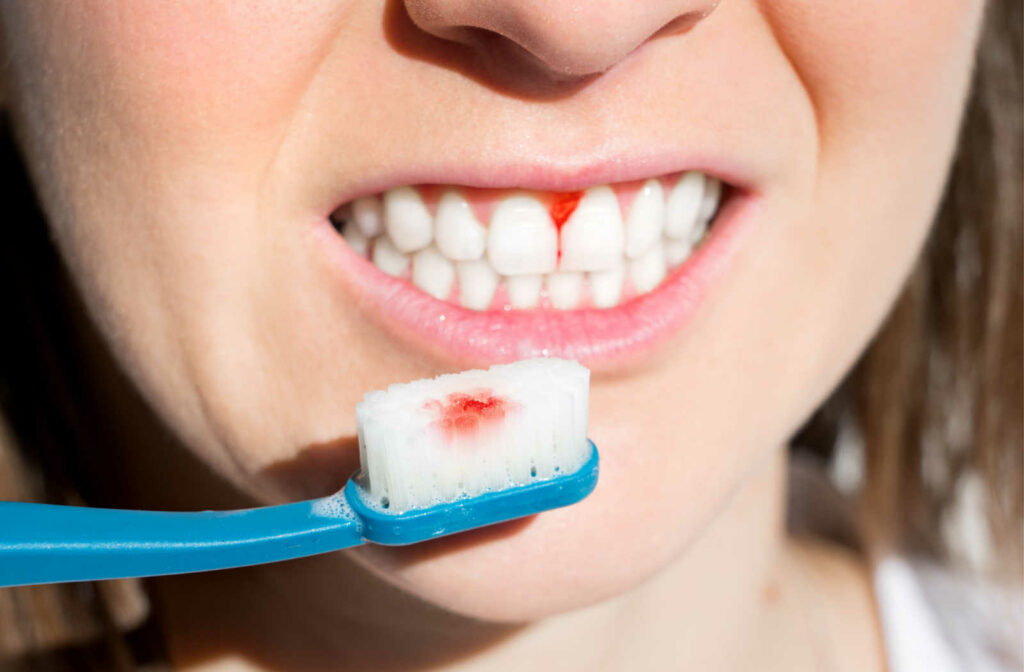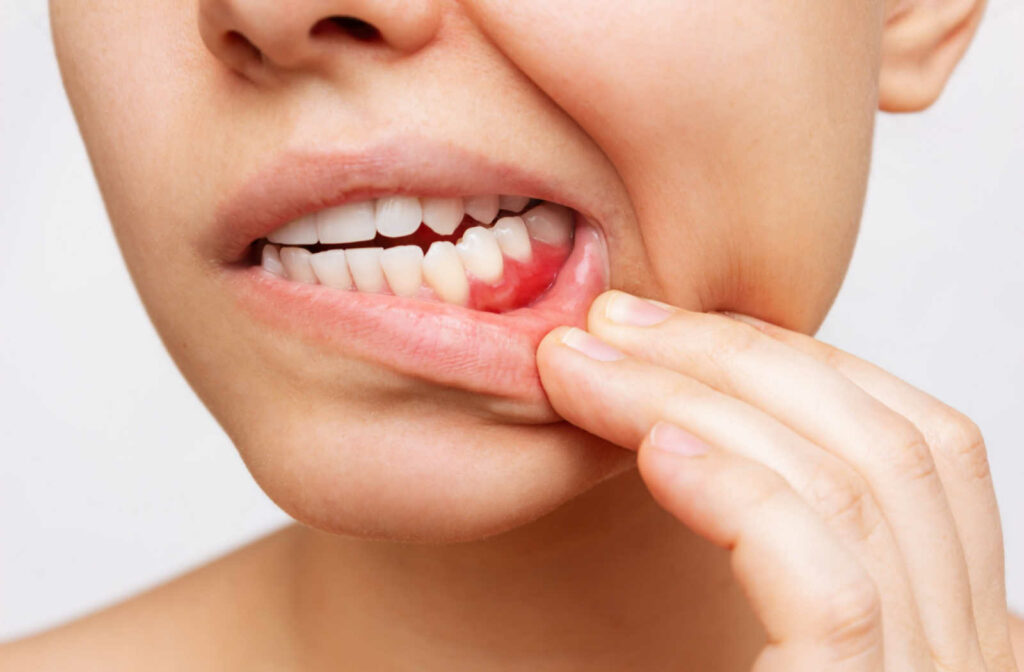It is a question no one wants to ask, but sometimes you have to wonder: why are my gums bleeding?
Bleeding gums are often one of the first signs indicating something may be wrong with your oral health—and a symptom we watch for during regular checkups. Bleeding gums could be a sign of gum disease, vitamin deficiencies, poorly fitted dentures, or improper dental hygiene.
While bleeding gums are not always cause for concern, noticing this common sign early can help protect your smile and allow your dentist to take measures to maintain the function and appearance of your teeth.
Gum Disease
Bleeding gums are the most common symptom of gum disease, which can present as gingivitis or periodontitis. Gingivitis is an early stage of gum disease characterized by red, swollen gums that bleed easily when brushed. If left untreated, it can progress to periodontitis, which can cause tooth loss and spontaneous bleeding.
When plaque builds up on the teeth and gums, it can mix with the sugar from foods and produce acid that wears away the top layers of your teeth (enamel). Other factors can also increase the risk of gum disease, such as:
- Smoking
- Diabetes
- Some medications
- Stress
- Hormonal changes, such as from pregnancy
According to Statistics Canada, approximately 21% of adults with teeth aged 18–79 have or have had periodontitis, the advanced form of gum disease. That is why it is crucial to maintain good oral hygiene and see a dentist regularly.
If your dentist uncovers gum disease as the cause of your bleeding gums, the treatment will depend on the form. For mild gum disease, a dental cleaning to remove the plaque and tartar buildup combined with good oral hygiene practices may reverse the damage. However, in more severe cases of gum disease, tooth extraction may be necessary.
Vitamin Deficiencies
Vitamin deficiencies can affect oral health, particularly vitamin C, which plays a role in collagen production. A lack of vitamin C, also known as scurvy, can cause the gum tissue to break down and become more susceptible to bleeding.
This bleeding can happen independently of oral hygiene, which means even if you are brushing and flossing regularly, a vitamin C deficiency can cause bleeding gums.
A healthy amount of vitamin C can also reduce the inflammation caused by gum disease. So not only can a lack of vitamin C cause bleeding gums, but taking it could reduce the bleeding caused by other oral conditions.
Foods high in vitamin C include:
- Citrus fruits and juices, such as oranges and grapefruits
- Kiwi
- Peaches
- Broccoli
- Snow peas
- Leafy greens, such as kale and arugula
While your doctor will typically be the one to diagnose a vitamin deficiency, your dentist can examine your gums and help to rule out other causes of gum bleeding.
Ill-Fitting Dental Appliances
Ill-fitting dental appliances, whether they be dentures, braces, or retainers, may also cause bleeding gums. These appliances can create pressure or irritation on the gums, leading to inflammation and bleeding.
Dentures that do not fit properly can rub against the gums and cause sore spots, eventually leading to bleeding. Similarly, braces and retainers can create pressure on the gums and cause them to become inflamed and bleed.
If you are experiencing bleeding gums due to ill-fitting dental appliances, you should see your dentist as soon as possible. They can adjust or repair the appliance to relieve the pressure on the gums. In some cases, you may need to switch to a different type of appliance.

Brushing Too Hard
Brushing your teeth is essential for oral health, but vigorous brushing could do more harm than good. Overbrushing could strip away the protective enamel on your teeth and cause your gums to recede. In time, this may cause sensitivity and bleeding gums.
Pregnancy
Blood flow can increase significantly during pregnancy due to hormonal changes. This bleeding may manifest as a bloody nose, but it can affect all soft tissue linings, called the mucus membrane. The mouth has such a lining, so someone pregnant could experience swollen gums and bleeding when brushing.
Preventing Bleeding Gums
Preventing gum disease and other potential causes of bleeding gums means maintaining good oral hygiene and overall health. A few ways to do this are to:
- Brush your teeth twice a day with fluoride toothpaste.
- Floss at least once every 1–2 days to remove plaque between your teeth and gums.
- Use an antimicrobial mouthwash to reduce plaque and gingivitis.
- Eat a healthy diet rich in vitamins and minerals, including vitamin C.
- Avoid smoking and other tobacco products.
It is also important to schedule regular dental checkups and cleanings to maintain good oral health and catch potential issues early.
Find the Cause of Your Bleeding Gums
At Kensington Dental Care, we believe prevention is key when it comes to oral health. Our proactive approach helps us identify issues early on and recommend treatments to keep your smile healthy. If you’re experiencing gum bleeding, don’t hesitate to book an appointment with us. Let us take care of your smile and give it the attention it deserves.










